Does anyone actually want AI-generated podcasts?

There has been much discussion about Google's NotebookLM in the Education and Learning Technology groups I am in, and the rest of my personal learning network as well, especially around the new feature of "AI" generated podcasts. I excerpted my title from a recent post and will add several of the shared public links below. This is my non-AI-generated contribution to the discussion, except for the Google Gemini section below and some clearly labeled images.
I agree with Kate Crawford; Artificial intelligence is "neither artificial nor intelligent", and feel the need to state that I am neither for nor against computers, machine learning, or all technology for that matter. I worked as a glassblower for four decades, supporting the manufacture of microprocessors in Santa Clara, California, for two decades. Since 2010 I have been involved in higher education, first as a returning adult student, and now as a the "Technologian" for a small graduate institute in Berkeley, California. I’m also a digital storytelling facilitator for StoryCenter.org. I accomplished Sociology and Liberal Arts associate's degrees in middle age and recently received the Canadian Certificate in Digital Humanities for my subsequent studies. I have no terminal degrees, or illnesses, for that matter. Just lived experience.
Language and Ideology
Craftspeople engage directly with material reality, not mediated by words. A Los Angeles native that grew up in Richard M. Nixon’s hometown, I learned very early not to always trust what people say or write. LLMs are built out of ‘tokens’; sections of words. They cannot ‘think’ or ‘know’, they just insert a statistically probable word in a sentence constructed to appear to be written by a human. And are just as trustworthy as a politician's promises.
When talking about “AI” I always recommend reading Princeton University Professor of Philosophy emeritus Harry Frankfurt’s short book “On Bullshit.” Originally an essay written for faculty colleagues in 1986, Princeton University Press published it in 2005 and it reached No. 1 on The New York Times bestseller list. According to Frankfurt, there is telling the truth and there is lying, which is knowing the truth but saying something else. And then there is bullshit, which is saying whatever is necessary to get what you want, regardless of whether it is true or false. In my view, LLMs are bullshit generators, or bafflegab generators, if you prefer.
My experiences have heightened my awareness of the inequities built into both our ideologies and the material products workers (now with robots!) produce. I have long been aware of, and interested in, the multitude of social groups I have encountered and worked with in California. They are too numerous to list. Spending summers in my mother's native state New Mexico made me aware of the waves of European colonization and their affects on the Indigenous peoples. I am a product of these histories.
The ideology of machines surrounds us: from the balloon construction of suburban houses to the steel and glass towers of our 'revitalized' cities. And I always wondered why German and Japanese cars are readily available in the US, but Russian and Chinese cars are not. Before thinking it is just because they make inferior products, remember the first Japanese car you rode in. If a $10,000 Chinese electric car is that good today, I would consider buying one. I do not think our markets are as free as we are told by our governments and corporations and their think tanks.
Social media platforms and their algorithms are dividing us into smaller and smaller tribes. I see LLMs as making things both better and worse. The ability to easily translate and summarize information can support communication and learning. We are all too familiar with the downsides. My primary concern is the faculty I work with ignoring "AI" like they have most previous 'edtech' initiatives. Their ideologies, for whatever reasons, do not serve their students.
NotebookLM
To further the NotebookLM discussion, I went to the source and 'asked' Google's Gemini what kind of Large Language Model (LLM) NotebookLM is. It 'replied';
NotebookLM is a unique kind of LLM. Here's how it's different from the others:
Grounded in your information: Unlike general purpose LLMs that are trained on massive datasets of text and code, NotebookLM is designed to be "grounded" in your own source materials. You upload your documents, and it becomes an expert on your information, not the whole internet.
Focus on learning and insights: It's specifically designed to help you learn from complex information faster. It can summarize your documents, answer questions about them, and even generate creative content based on your sources.
AI-first approach: NotebookLM is built with an "AI-first" philosophy, meaning the entire user interface and experience is designed around the capabilities of the language model.
Think of it as a combination of an LLM and a personal research assistant. It's like having a super-smart study buddy who has read all your materials and is ready to help you understand them better.
ePortfolios
My main interest is in eportfolios for lifelong learners so I added 50 eportfolio related documents from my Google Drive to NotebookLM, mostly journal articles. I also included slides from a seminar I gave and a document I generated using Anthropic's Calude.ai. Then I used NotebookLM's new “Audio Overview” feature to create this “podcast.” And it is hosted on my own instance of the free and open source software Castopod. I have control over where it is available so it canna be removed by an algorithm. Is my ideology showing?
I think the LLM did a pretty good job of summarizing key points, but the references, especially to the slides, are made up: BS, or, bafflegab. Slide 37 was referenced several times. It was the end slide with the organization name and contact information. I don't think NotebookLM can 'read' images, so it probably didn't include the information in this concept map from my slides either. It will be a big improvement if Google adds the ability to edit the audio by editing a transcript.
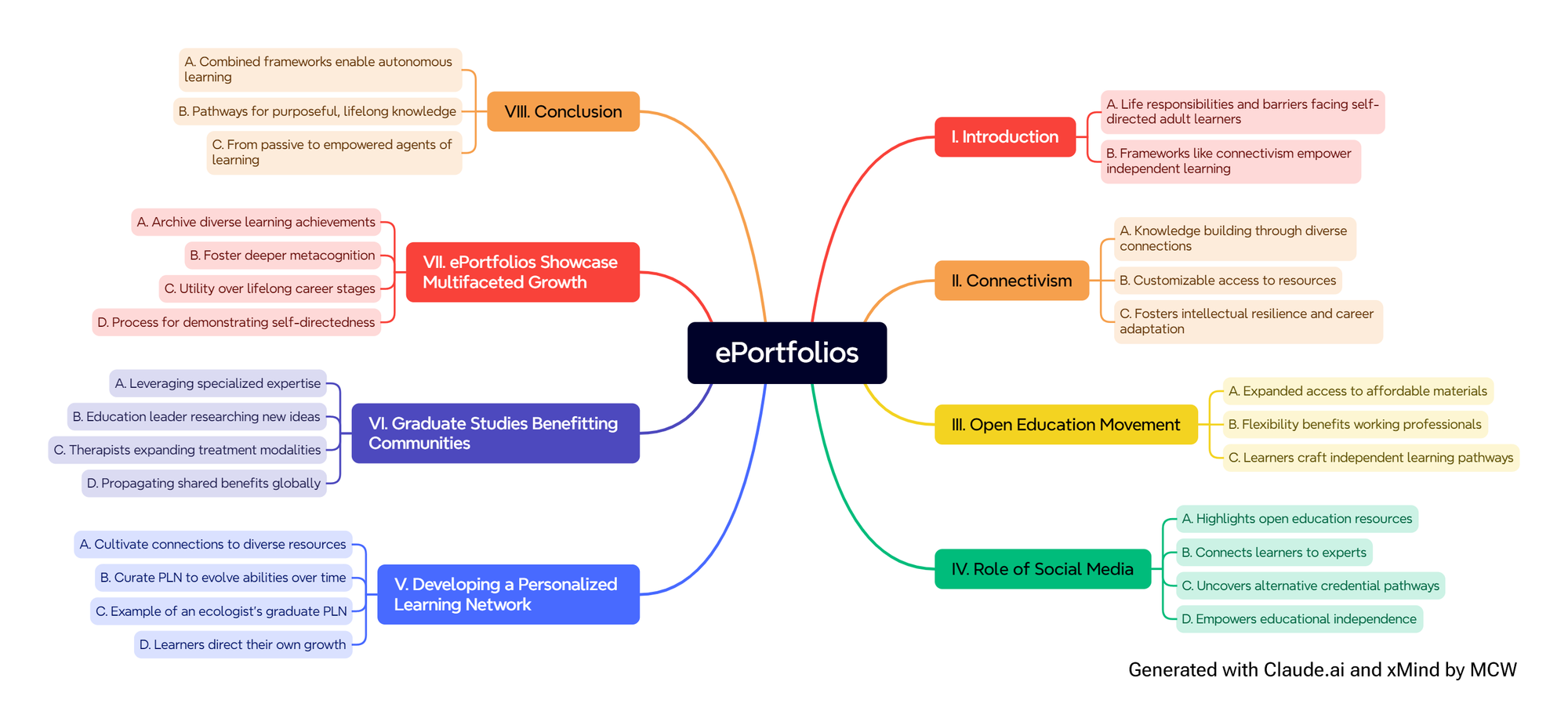
I find LLMs are good for brainstorming, summarizing, outlining, generating drafts, and sometimes converting outlines to markdown. I use Claude.ai and often import the .md file it can generate into xMind to make concept maps like the one above. (click to expand)
Here's the generated .md file. (When I collapsed it, the Ghost editor removed the line breaks.) You are welcome to experiment with it wherever you can import markdown. I'm enjoying learning the affordances of my new self-hosted Ghost platform.
ePortfolios for Lifelong Learners
#ePortfolios ## I. Introduction ### A. Life responsibilities and barriers facing self-directed adult learners ### B. Frameworks like connectivism empower independent learning ## II. Connectivism ### A. Knowledge building through diverse connections ### B. Customizable access to resources ### C. Fosters intellectual resilience and career adaptation ## III. Open Education Movement ### A. Expanded access to affordable materials ### B. Flexibility benefits working professionals ### C. Learners craft independent learning pathways ## IV. Role of Social Media ### A. Highlights open education resources ### B. Connects learners to experts ### C. Uncovers alternative credential pathways ### D. Empowers educational independence ## V. Developing a Personalized Learning Network ### A. Cultivate connections to diverse resources ### B. Curate PLN to evolve abilities over time ### C. Example of an ecologist’s graduate PLN ### D. Learners direct their own growth ## VI. Graduate Studies Benefitting Communities ### A. Leveraging specialized expertise ### B. Education leader researching new ideas ### C. Therapists expanding treatment modalities ### D. Propagating shared benefits globally ## VII. ePortfolios Showcase Multifaceted Growth ### A. Archive diverse learning achievements ### B. Foster deeper metacognition ### C. Utility over lifelong career stages ### D. Process for demonstrating self-directedness ## VIII. Conclusion ### A. Combined frameworks enable autonomous learning ### B. Pathways for purposeful, lifelong knowledge ### C. From passive to empowered agents of learning
Sometimes generated images help support a point, although they can be as insipid as LLM generated text. I find that even the best image generators demonstrate the statistical nature of LLMs and tend toward the western bourgeois mean. Hopefully, diversity will increase as more cultures and groups create and train their own LLMs. I'm waiting for the poor majority and worker's versions, from any culture.
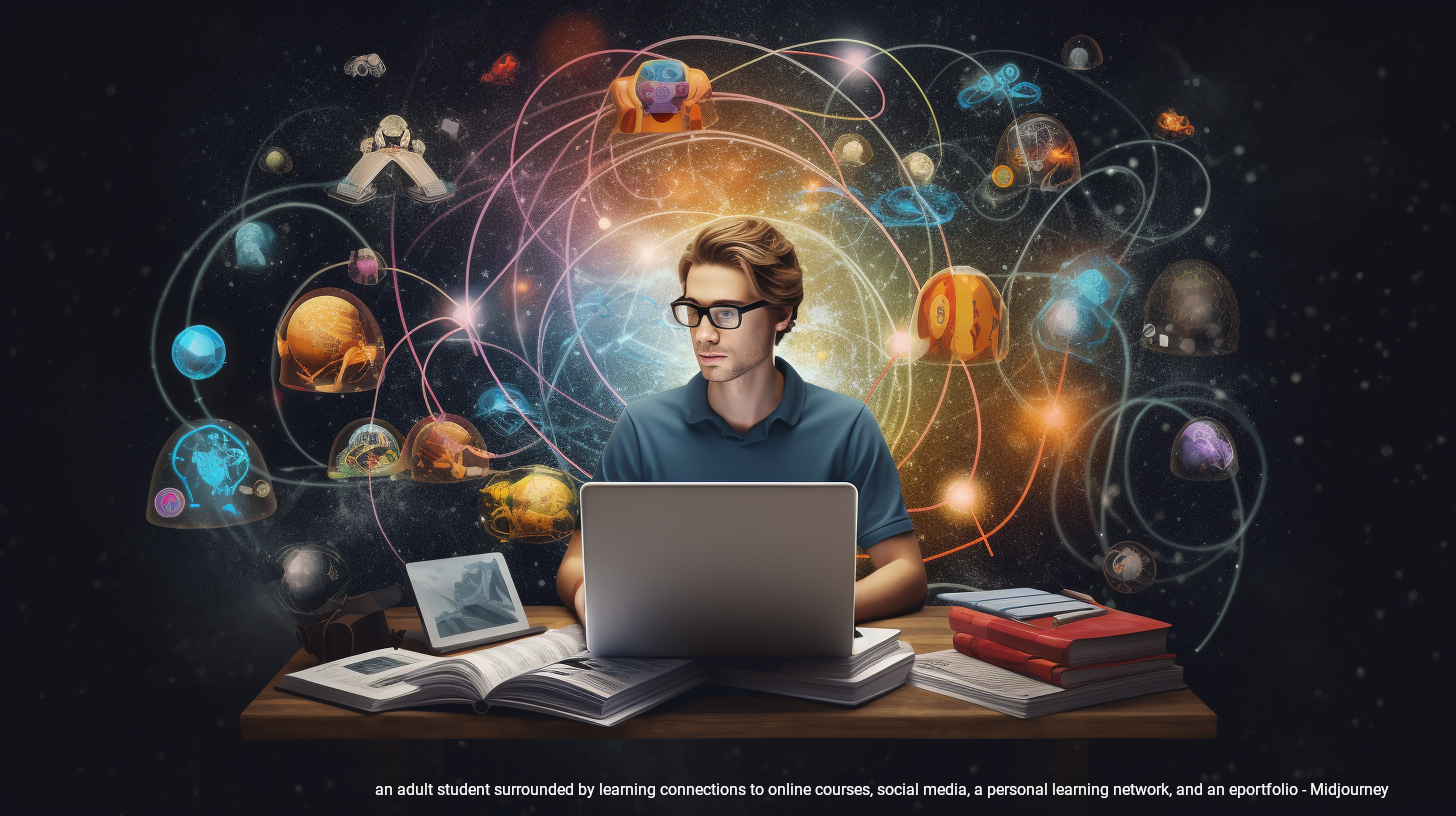
Here is my full seminar "ePortfolios for Lifelong Learners" (further research showed me lifelong is the more common term than lifetime learners) from last December. It is hosted on my own instance of free and open source PeerTube. Now my ideology is really showing.
NotebookLM examples
The NotebookLM example I found most inspiring was created by Anya Medvedev of Georgetown University's Center for New Designs in Learning and Scholarship and shared in a group chat. Its creator put Chegg's 2023 "Global Student Survey" into the LLM and generated an high quality podcast accurately summarizing the research data. This is a promising use of LLMs. While I didn't check each data point, I had the document open while listening and found most of the main points made in the 'podcast' in the survey. They were summarized well, and as the survey reported, in this seven minute 'podcast.' You can check it for yourself.
Click the image to download the survey and check NotebookLM's accuracy.
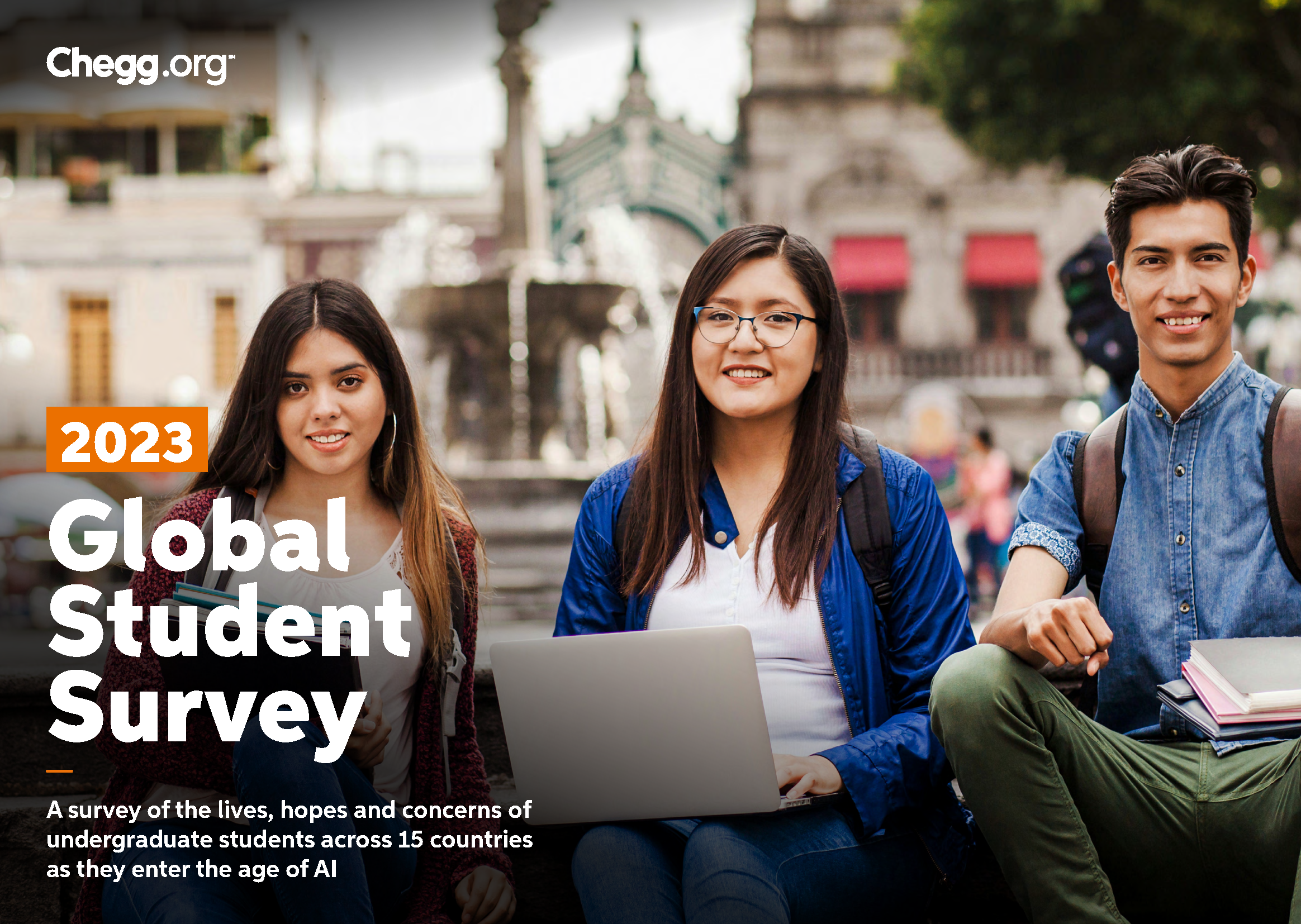
The 2024 Digital Education Council Global AI Student Survey "...covers the status of AI usage and readiness, student perception of AI use cases, expectations and preferences on university actions on AI, satisfaction with institutions’ AI adoption, concerns and key attributes for AI use." Click the image to download the survey. (requires email sign up)
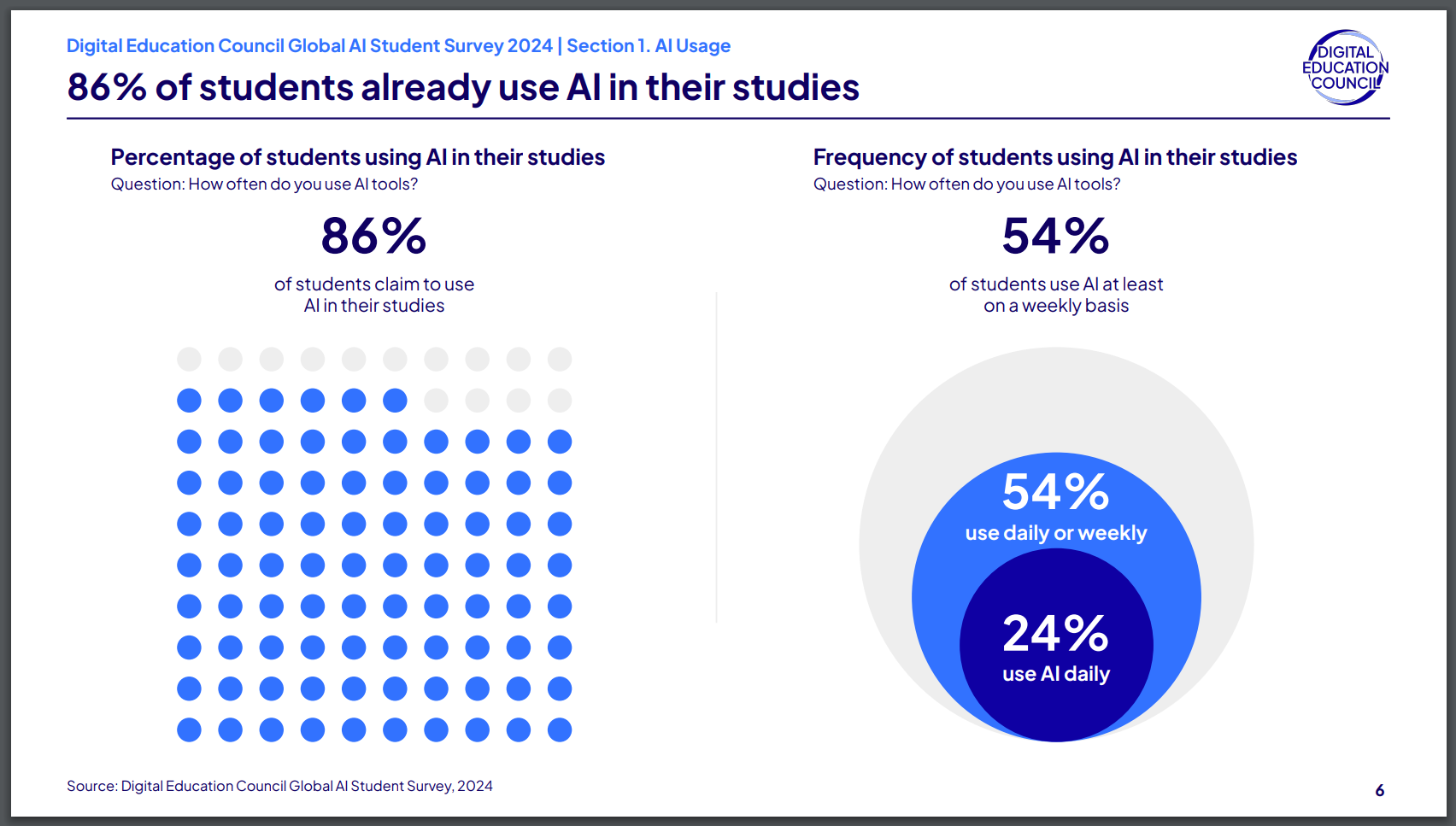
There is even an "open" NotebookLM available on Hugging Face. It was made in an afternoon (by a computer scientist) and you can download it from GitHub and install it on your own machine, or, click the link below to try an online version. I haven't tried it yet.
https://huggingface.co/spaces/gabrielchua/open-notebooklm
Here is a more complex open source podcast generator. It looks like it generates a transcript and then allows one to edit the transcript before regenerating the audio. The app requires an OpenAI API key to function. I haven't tried it yet either. Who can keep up?
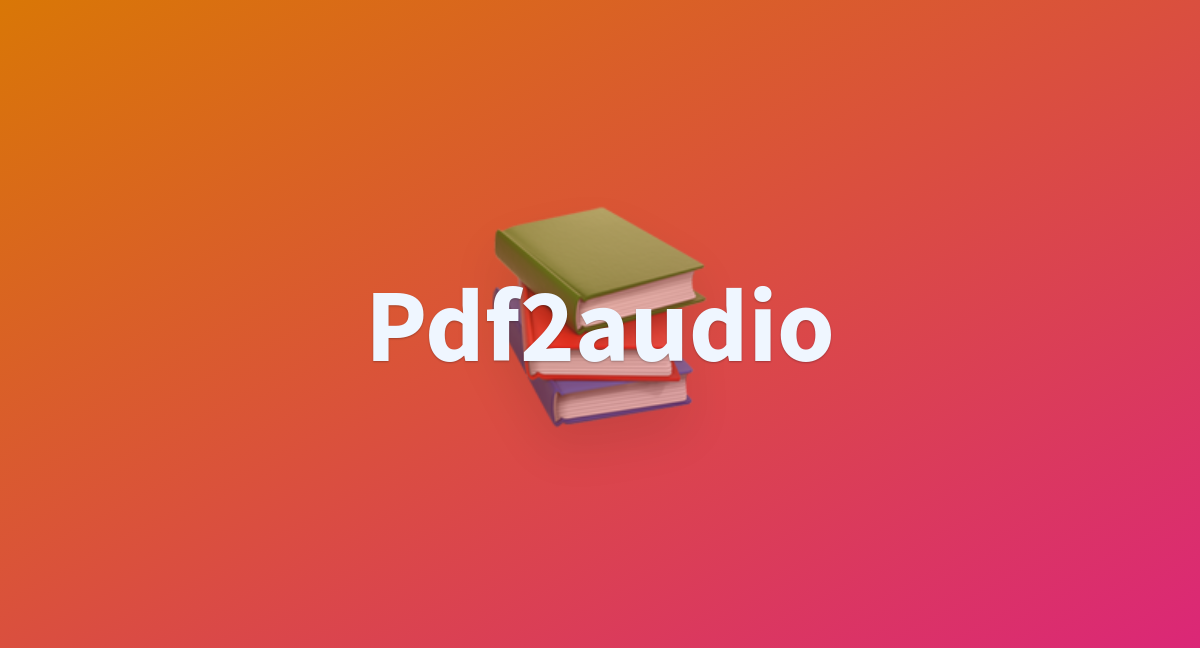
D'Arcy Norman uploaded his dissertation exploring the "integration of Human-Computer Interaction (HCI) and the Scholarship of Teaching and Learning (SoTL) to analyse and enhance teaching practices." He reported results similar to the others in the group. He shared the NotebookLM generated podcast, the text of the generated summary, and a link to his dissertation.
https://darcynorman.net/2024/09/23/notebooklm-summarizes-my-dissertation/
I collected more links to AI commentary from the groups' discussions.
https://marcwatkins.substack.com/p/when-access-to-ai-outpaces-attention
https://marcwatkins.substack.com/p/no-one-is-talking-about-ais-impact
https://open.substack.com/pub/timbrunelle/p/152-ask-the-wrong-questions
I have curated and collected hundreds of resources pertaining to "Artificial Intelligence & Higher Education" in a Google doc. If anyone has an army of students that want to annotate the entries, please make a copy and share the results.
Our Next Steps
LLMs present both opportunities and challenges. Their wide adoption and integration into so many digital platforms demand we learn how they work and how they can be used skillfully, especially in education. I promote a critical approach, to identify and share the opportunities and threats they present for all of us. Again, I don’t think we should call these tools artificial intelligence or “AI”, doing so obscures the ideologies and power imbalances built into them.
I prefer Doug Engelbart’s framework of augmenting human intellect, or, cognition, if you question the concept of intelligence. This aligns with my preferred education ideology: Connectivism. Engelbart wanted us to use “modern technology to give direct aid to an individual in comprehending complex situations, isolating the significant factors, and solving problems.” Now, if I could convince all the faculty I work with that we have not only the ability, but the duty to engage with students in the communication and collaboration that Engelbart demonstrated in his “mother of all demos” in 1968. And yes, after reading the dozens of posts about NotebookLM in my groups, I think generated podcasts will undoubtedly play a small part in education from now on.